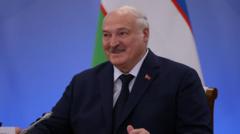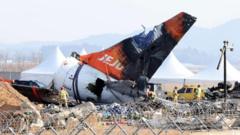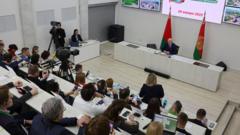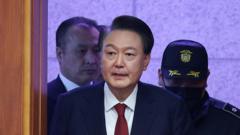Amid escalating tensions following the arrest of President Yoon Suk Yeol, South Korea finds itself starkly divided, as supporters and opponents clash both on the streets of Seoul and within political discourse. The fallout from Yoon's controversial martial law declaration has fueled protests and uncertainty across the country.
South Korea's Political Turmoil: Yoon Suk Yeol's Arrest Sparks Nationwide Protests
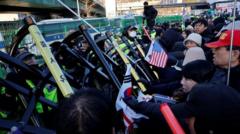
South Korea's Political Turmoil: Yoon Suk Yeol's Arrest Sparks Nationwide Protests
The arrest of suspended South Korean President Yoon Suk Yeol has intensified the nation's political divisions and unrest, showcasing stark contrasts in public opinion.
Tears flowed as supporters of suspended South Korean President Yoon Suk Yeol reacted with despair outside his home following his arrest, a moment long anticipated yet shocking. The arrest came after weeks of failure to detain him, and its timing has only highlighted a growing divide in a highly polarized South Korea. “This country is in crisis,” a tearful supporter lamented, encapsulating a sentiment shared by many on the pro-Yoon side.
Since announcing martial law on December 3, 2024, Yoon had retreated within the confines of his presidential residence in central Seoul while both supporters and opponents rallied outside. The site of ongoing protests, Yongsan became a battleground of emotions, as hundreds braved sub-zero temperatures, sharing hot food and drinks as they awaited news about Yoon's fate.
As police gathered, the atmosphere grew tenser, with confrontations between police forces, numbering around 3,000, and supporters who felt unsupported and ridiculed. Conversely, opponents of Yoon gathered in jubilation, underscoring the extreme sentiments evident on both sides of the political spectrum.
Public sentiment has split sharply since Yoon's announcement of martial law, polarizing opinions into supporters who believe in his direction and those who accuse him of misuse of power. This crux of political discord widened when even members of Yoon's own party voted in favor of his impeachment.
The normally vibrant end of year in South Korea is mired in a sense of gloom fueled by political upheaval and a recent tragic accident involving Jeju Air. Yoon remained largely out of sight following his impeachment, communicating only through online media, indicating a disconnect from both supporters and the political scene at large.
In a rare public address upon his arrest, Yoon claimed he would cooperate with the Corruption Investigation Office (CIO) while contesting the legal basis of the arrest. His legal team argued that charges against him should not fall under the CIO’s jurisdiction, igniting further debates in the political arena.
As Yoon now faces a precarious legal battle, the narrative around his presidency remains volatile, with public attention keenly focused on his potential statements and behavior during this unprecedented chapter in South Korean history. The ongoing polarization raises concerns that the nation's political climate will remain fractious in the aftermath of his arrest.













